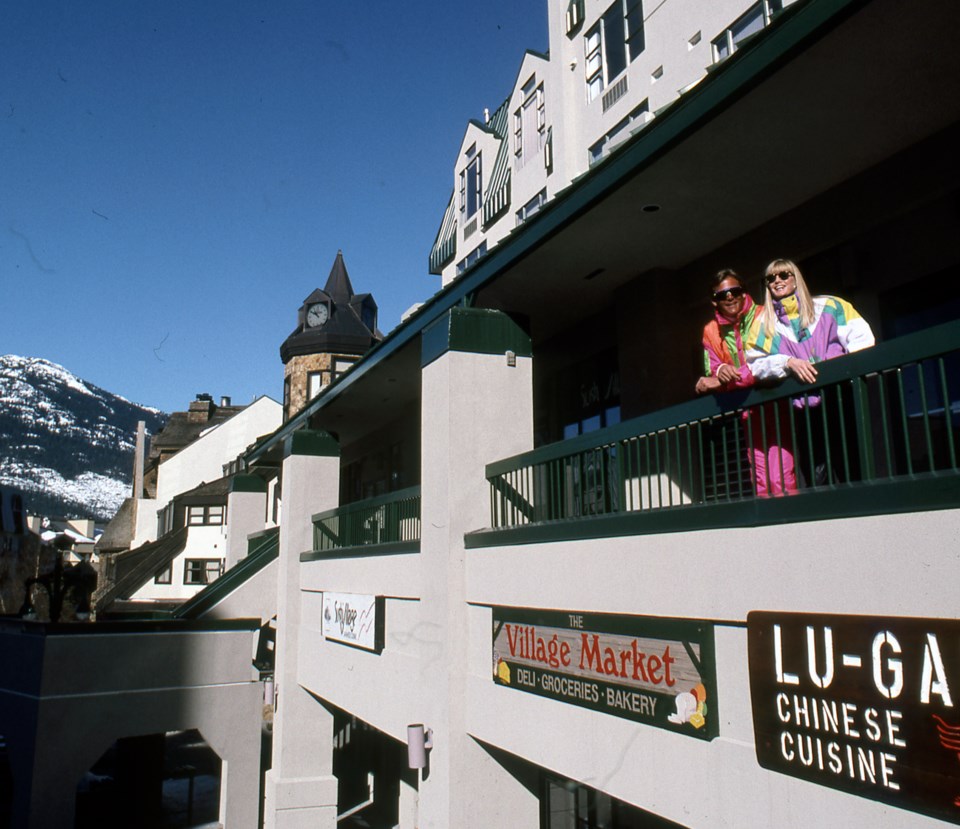The early years of the 1980s saw Whistler Village begin to come together, with the first buildings completed and businesses starting to open. This growth, however, soon slowed dramatically as a major recession hit North America and Whistler’s future became very uncertain.
In 1982, Al Raine stepped down as the executive director of the Whistler Resort Association (WRA; today known as Tourism Whistler) after working pretty much non-stop on the “Whistler project” since 1975. He and Nancy decided to move to Switzerland with their sons and, according to Nancy, the headlines described their move as “Rats deserting the sinking ship.” By the time they returned in 1984, the economy was beginning to turn around, though Whistler was still struggling. Whistler Village was a mix of completed buildings next to sites of concrete and rebar, one of which the Raines decided to buy and build a hotel on.
Whistler’s prospects were looking up by the end of 1985 when Nancy Greene’s Olympic Lodge was completed, with the WRA reporting in November hotel bookings for the winter were already up 57 per cent over 1984-85. This boded well for the many businesses getting ready to open in the Village.
As well as being a 90-room hotel, Nancy Greene’s Olympic Lodge also contained retail locations, and the opening of the hotel also saw the opening of new businesses. The only restaurant, Isabelle’s, was named after the daughter of proprietors Curt and Monica Czerveniak and served breakfast, lunch and dinner daily. Bullwinkle’s featured stained glass, Tiffany lamps and pottery while The Country Store (which also had a location in Squamish) offered various souvenirs including hand-made candles and soaps. Whistler Gifts II was also a second location, as owners Toshi and Setsuko Hamazaki also owned Whistler Gifts in the Crystal Lodge.
Can-Ski’s first Whistler location offered ski equipment and gear and the Kettle Creek Canvas Company, Sports Style (a third store for the owners of Village Sportstop and Whistler Village Sports), and More Tops (a companion to Jan Holmberg and Ted Nebbeling’s Whistler Tops) all sold various types of clothing, with More Tops even offering on-site embroidery and monogramming. Nancy T, another clothing store that catered specifically to children, was opened by Nancy Treiber.
The final business to open in Nancy Greene’s OIympic Lodge was One-Hour Photo, owned by Rick Clare and Terry Heenan. The store offered camera rentals, equipment sales, and film processing, with a special 24-hour rate for locals. For the first two full months of operations, One-Hour Photo also contributed 50 cents from every roll of film processed to the Dandelion Daycare Society, which briefly had to delay opening its first daycare facility in November as they did not have enough money to finish the interior of the new building.
Further along the Village Stroll, another building of businesses opened the same month: the Brandywine building. Though the Brandywine offered fewer retail spaces, the building did fit in Whistler’s first 24-hour convenience store, run by Mark and June Bombay, another location of Jim McConkey’s Sports Store, and Susie Holland’s Blackcomb Therapy Centre, which sold “just about everything to soothe and rejuvenate weary skiers,” as well as a few new eatery options. At Lu Gardens, Shirley Jang and her staff offered eat-in and take-out Chinese cuisine. Next door, the Original Ristorante was spread over two floors, while on Lu Garden’s other side Mikito “Miki” Homma and two friends opened up Sushi Village, Whistler’s first Japanese restaurant.
Many of these businesses that opened at the end of 1985 have gone and the buildings that house them have changed over the past 39 years (the Brandywine is now the Sundial Hotel and Nancy Greene’s Olympic Lodge first lost the word Olympic and then became part of the Crystal Lodge). A few, however, continue on in different locations while a couple are still operating out of the same locations. Near the base of Whistler Mountain, the Original Ristorante changed its name in 1995, taking after its owner Lawrence Black and rebranding as Black’s Pub, while Sushi Village continues to operate just two doors down.




